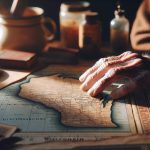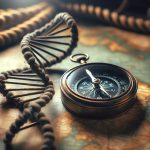The idea of tracing your lineage back to nobility is fascinating. People often seek connections with their past, aiming to uncover a story that ties them to bygone eras of history. Amidst a plethora of DNA testing services, pinpointing the one that accurately unlocks the door to royal ancestors is quite the task. This comes down to not just finding any service, but one that offers depth and precision in its analysis, backed by a substantial database for more accurate matches.
After an extensive review of various DNA kits focusing on their ability to identify noble connections, one emerges as particularly noteworthy: AncestryDNA. It’s the go-to for anyone serious about exploring their potentially regal heritage. The reasons are manifold; it boasts an impressive genetic database which significantly ups the chances of discovering blue-blooded relatives. Plus, it excels in breaking down regional ancestry with remarkable detail—vital for tracing your roots back through centuries.
But what really sets AncestryDNA apart is its commitment to privacy. In an age where data breaches are all too common, knowing that such sensitive information is treated with utmost care adds peace of mind.
So if you’re itching to find out whether you’ve got kings or queens in your family tree,AncestryDNA might just be your ticket into the annals of history.
The top DNA test kits for tracing royal lineage if you’re in a hurry
If you’re on a quest to uncover whether your roots trace back to royal lineage, there’s a treasure trove of DNA testing services out there ready to guide you on your journey. Each service brings something unique to the table, making the pursuit even more fascinating.
Leading the charge is AncestryDNA, renowned for its vast database and historical archives. It stands as the go-to option for those looking to connect their present with a regal past. The sheer volume of data at your fingertips means delving into your ancestry reveals not just names and places but stories waiting to be told.
For budget-conscious explorers, MyHeritage offers an attractive entry point without skimping on depth. With tests beginning at $89, it bridges affordability with access to extensive family trees and historical documents. This makes piecing together your lineage both achievable and enriching.
When health intersects with history, LivingDNA steps in. It’s not just about tracing where you come from but understanding how these ancestral ties might influence your well-being today. It’s a deep dive into the past with an eye on the future.
Global citizens will find a kindred spirit in 23andMe. Its widespread recognition and global reach increase the odds of connecting dots across continents, hinting at noble connections that span borders. The world suddenly seems smaller yet infinitely more interconnected.
Digging deeper into lineage specifics, FamilyTreeDNA excels in dissecting maternal and paternal threads separately while also offering tools for building out your family tree. It’s like having a detailed map that guides you through each branch of your family’s story.
Lastly, for those who seek nothing less than comprehensive analysis,< strong>Nebula Genomics decrypts every strand of DNA information available. This approach ensures no stone is left unturned in verifying royal ancestry claims with precision.
Top DNA Tests for Tracing Royal Roots: An Overview
AncestryDNA: Top DNA Test for Discovering Royal Roots
Dive into your past like never before with AncestryDNA, a service that offers an unparalleled journey through your genetic history. With the world’s most extensive collection of DNA samples, totaling 18 million, it’s your ticket to discovering your roots and possibly uncovering connections to royal ancestors. The process couldn’t be simpler: just use a saliva swab and wait for the results, which are ready in about 6 to 8 weeks.
Right now, there’s an irresistible offer on the table – the Ancestry Deal 2024. For a limited time only, you have the chance to grab the Ancestry DNA + Family Tree Bundle at half its usual price. It’s a steal that’s too good to pass up if you’re eager to explore both your genetic makeup and build out a family tree.
What sets AncestryDNA apart is its unmatched genetic database. If tracing blue blood or nobility is what you’re after, this vast repository increases your odds of finding long-lost relatives with regal ties. The service doesn’t just skim the surface; it delves deep, analyzing your DNA against thousands of unique regions across the globe. This means pinpointing specific areas where royal lineages thrived and offering you a more nuanced understanding of where you come from.
Beyond mapping out where your ancestors hailed from, AncestryDNA‘s ThruLines feature plays detective on how exactly these historical figures fit into your family tree. It acts as a bridge connecting you directly to potential royal forebears by sifting through information from DNA matches.
But diving into such personal explorations requires trust, something AncestryDNA doesn’t take lightly. Rest assured that privacy is top-tier here; strong encryption guards every piece of data, ensuring only you have access to whatever royal connections or familial insights emerge during this fascinating quest.
So why not embark on this adventure? With AncestryDNA, unlocking secrets of yesteryear has never been so accessible—or exciting.
MyHeritage: Top Budget-Friendly DNA Test for Discovering Royal Ancestry
Discover your roots and possibly connect to nobility with MyHeritage. This platform offers an easy way to explore your ancestry through a simple saliva test, delivering results in just 3-4 weeks. Its standout feature is finding relatives you might not know existed, breathing life into your family tree with multimedia elements such as photos, videos, and music.
The current deal on MyHeritage makes it the most affordable DNA testing option out there – just $39 for a full kit. It’s worth keeping an eye out since these promotions pop up now and then.
Especially adept at unearthing European heritage, MyHeritage shines if you’re digging into potential ties to royalty. It compares your genetic markers against a large database to find connections to aristocratic ancestors. This is particularly handy for those tracing lineage back to European monarchs.
What sets it apart is its Smart Matches technology that sifts through millions of family trees looking for matches. Stumbling upon a match could be your ticket to uncovering royal bloodlines. The Chromosome Browser takes this further by offering a detailed comparison of your genetics with others’, enhancing the possibility of confirming distant familial relationships.
Another cool tool is the Ethnicity Estimate which breaks down your heritage by percentage. For anyone with European descent, this can illuminate areas where royal forebears might have hailed from, refining the search for one’s historical roots.
Hop on board with MyHeritage and start an exciting journey back in time—maybe even discovering noble connections along the way!
LivingDNA: Top Choice for Understanding Health Traits Through Ancestral Lineage
Diving into your family history with LivingDNA opens up a window to possibly royal ties in your ancestry. This service digs deep, using a simple saliva sample, to uncover if your DNA shares characteristics with historical noble lineages from across the globe. Imagine discovering that you share genetic markers with kings and queens of yore—it’s like finding hidden treasures within yourself.
But LivingDNA doesn’t stop at just mapping out your regal connections. It goes further by examining how these ancestral traits might play a role in your current health. Ever wondered why you have certain unique quirks or health conditions? Your genes hold clues linking back to the ailments and attributes of royals from centuries past.
What sets this platform apart is its blend of history and science, delivering not only an ancestry report but also insights into how these findings relate to your health today. It’s as if you’re getting a personalized narrative that weaves through time, connecting dots between your physical well-being and illustrious forebears.
So, when you embark on this journey with LivingDNA, it’s not just about tracing lineage—it’s about understanding yourself better through the lens of history. In about 6-8 weeks after sending off a sample, you’re handed a report rich in details about where you come from and how it influences who you are now.
In short, stepping into the world of LivingDNA is both an exploration of self and an adventurous dive into history all rolled into one.
23andMe — A Well-Known DNA Test That May Link You to Royalty
Dive into the journey of discovering your roots with 23andMe, an innovative platform designed to unveil the intricate tapestry of your ancestry. This remarkable tool offers a window into your genetic lineage, potentially linking you to nobility. By comparing your DNA with historical records and populations known for their royal connections, it shines a light on whether royalty runs in your veins.
The magic doesn’t stop there; the Ancestry Composition report is like having a personal time machine. It meticulously breaks down your DNA by geographical regions, pinpointing where your forebears hailed from. Spotting markers associated with ancient monarchies could hint at a regal past, presenting this information through an easy-to-understand global map visualization.
For those curious about connecting with present-day relatives who might share a slice of this noble pie, 23andMe‘s Relative Finder tool is nothing short of fascinating. It scours through DNA segments to find living cousins possibly tied to royal lineages, further cementing your aristocratic heritage.
While exploring potential connections to kings and queens of yore is thrilling, 23andMe also delves into the more primal aspect of our ancestry, Neanderthal heritage. This segment adds layers to our understanding of human evolution and migration patterns.
Embarking on this exploration with 23andMe isn’t just about tracing lineage; it’s about uncovering the stories woven into our DNA over millennia, offering insights that bridge past and present in ways once thought unimaginable.
FamilyTreeDNA — Ideal for Independently Tracking Mother’s or Father’s Ancestry
Delving into your past can unveil tales of royal ancestors, and FamilyTreeDNA is the lantern guiding you through this historical maze. Its mtDNA test shines a light on your mother’s lineage, digging deep into mitochondrial DNA passed down by her. This exploration reveals ancestral origins, potentially connecting you to nobility.
For those curious about their father’s heritage, there’s the Y-DNA test, specifically for individuals with a Y chromosome. It retraces your paternal ancestry back through generations. This could be key in confirming ties to historical figures or surnames from your dad’s side of the family, especially since many royal lines are traced paternally.
The magic doesn’t stop there; FamilyTreeDNA goes further by linking you with distant kin who share snippets of your DNA. This feature is gold for anyone piecing together family rumors of blue-blooded ancestors. Connecting with these newfound relatives not only broadens your family tree but also bolsters claims to regal connections.
Privacy is paramount at FamilyTreeDNA. Rest assured that delving into familial secrets remains a private affair—your genetic info is locked down unless you choose to share it for matching purposes. For those navigating the delicate threads of royal bloodlines, this privacy assurance means peace of mind as you explore and connect discreetly.
So why wait? Embark on a journey with FamilyTreeDNA, where uncovering majestic roots might just be a saliva swab away!
6. Nebula Genomics: Top Choice for Complete Genome Sequencing
If you’re on a quest to uncover whether kings and queens are part of your family tree, Nebula Genomics has got you covered. They take a unique approach by examining every bit of your DNA through whole genome sequencing. This method is like reading your genetic blueprint from cover to cover, ensuring no stone is left unturned in your royal search.
This technique stands out because it doesn’t just skim the surface like many other tests. Instead, it dives deep into your ancestry, pinpointing specific markers that might connect you to historical figures or noble lineages. It’s all about giving you a detailed map of where you come from, potentially including some regal relatives.
But what’s cool is how they make sense of all this complex data. Nebula Genomics breaks down intricate genetic information into an easy-to-understand report that could reveal fascinating insights into your heritage, think of it as translating an ancient scroll that tells the story of your lineage.
And don’t worry about privacy; they’ve got it locked down while keeping you in the loop with any new findings. As science advances and uncovers more about our connections to the past, Nebula Genomics continually updates your profile so you won’t miss out if a royal ancestor pops up in their research.
So if tracing back to royal roots sounds like an adventure worth taking, Nebula Genomics might just be the trusty guide you need on this journey through history and genetics.
Guidelines for Selecting the Top DNA Kit for Royal Heritage
Choosing the right DNA test for exploring royal roots is crucial. It’s not just about picking any kit off the shelf; you need one that ticks all the boxes for your unique quest. Key things to focus on include how precise the test is, how vast its DNA pool is, and how deep it digs into your ancestry.
Firstly, aim for a test with a hefty database. The bigger, the better—it means more potential links and deeper insights into your noble connections. Also, a service that breaks down ethnicity with precision can pinpoint exactly where your regal forebears hailed from.
Another critical feature is integration with historical records and family tree-building tools. This combo is like a time machine, letting you trace back through history to spot connections to royal figures rooted in documented evidence.
Some tests go the extra mile by zooming in on specific genetic markers tied to royalty. These tests look at Y-DNA or mtDNA—keys to unlocking direct lines of descent that could reveal if blue blood runs through your veins.
Don’t forget about privacy—a big deal in DNA testing. Make sure you’re clear on how a company handles your genetic info and who they might share it with.
Ease of use and support are also vital. A straightforward interface plus access to experts can make all the difference in interpreting your regal lineage.
Last but not least, don’t overlook community feedback and peer reviews—especially from others who’ve walked this path before. Insights from fellow ancestry seekers can be invaluable as you embark on this journey to uncover your royal heritage.
In sum, finding out if there’s a crown lurking in your family tree isn’t just about sending off a sample and crossing fingers; it’s about making an informed choice armed with knowledge of what makes each test stand out.
Exploring Genetic Indicators Linked to Royal Families
When delving into the roots of royal families, tracing specific genetic markers becomes essential. Among them, the Y-DNA and mtDNA haplogroups stand out for their connection to historical lineages of nobility. The R1b haplogroup, for instance, is quite prevalent among Western European aristocracies where numerous dynasties emerged. On the maternal side, particular mtDNA clusters are tied to ancient regal lines.
Discovering such genetic footprints in your DNA might hint at noble forebears. However, it’s critical to remember these genetic sequences aren’t reserved solely for blue-blooded individuals. They’re frequently found across the broader populace due to centuries of migration and blending of families.
In essence, while certain haplogroups can spark dreams of a majestic heritage, they’re more a testament to our shared past than an exclusive badge of royalty.
Unique Health Issues in Royal Families
Delving into the history of royal bloodlines offers more than a glimpse into your ancestral past; it opens up a window to understanding health-related issues unique to nobility. Due to the common practice of marrying within royal circles, some genetic conditions became more widespread among European royals. A notable example includes hemophilia, often referred to as the « royal disease, » which became synonymous with Queen Victoria’s lineage and affected numerous European dynasties.
With advancements in technology, modern DNA testing now provides an opportunity to identify markers linked to these hereditary conditions. This not only sheds light on potential health risks tied to one’s regal background but also highlights the importance of genetics in historical family connections. Thus, exploring your royal roots is a journey that transcends mere ancestry—it’s a deep dive into the intertwining realms of history and biology.
The Importance of Kings and Queens in Culture
Uncovering ties to nobility is more than just a nod to the past; it’s a dive into the rich traditions and practices that have shaped entire communities. When you trace your lineage back to royal ancestors, you’re peeling back layers of history, getting up close with the societal norms and rituals that your forebears were part of. Imagine finding out that kings and queens are in your family tree—it’s like being handed a key to understanding how their world worked, how they celebrated, mourned, and governed.
Thanks to modern science, particularly DNA testing, we’re now able to get snapshots of our ethnic backgrounds. These genetic breadcrumbs can reveal the diverse cultural fabric we’re woven from. It’s fascinating how a simple test can highlight our connection to different parts of the world—showing us not just where we come from but also hinting at why we might be drawn to certain customs or feel at home in specific environments.
Diving into this journey enriches our sense of self and roots us more deeply in history’s narrative tapestry. It’s about piecing together the story of those who came before us and seeing how their lives influenced ours today. Whether it’s through inherited traits or learned behaviors passed down through generations, embracing this heritage gives us a fuller picture of who we are and where we belong in this vast human family.
Exploring Old Documents
Exploring royal roots requires a blend of scientific insight and historical detective work. If you’re keen on unraveling your regal lineage, combining DNA test outcomes with old records is crucial. DNA tests can hint at where your ancestors hailed from and possibly connect you to noble lines. However, it’s the age-old documents such as listings of births, marriages, deaths, landholdings, and aristocratic registers that truly cement those ancestral ties.
For anyone diving into this quest, tapping into resources like national archives, societies dedicated to genealogy, and specialized online platforms focusing on aristocratic ancestries is key. These treasure troves are vital for confirming kinships and meticulously reconstructing one’s majestic ancestry.
Exploring African Royal Ancestry with DNA
Africa’s vast heritage is woven from countless royal families and tribes, each with its unique history. The modern tool of DNA testing offers a fascinating glimpse into this past, revealing potential ties to these noble lineages. Some African haplogroups, or genetic markers, can suggest ancestry linked to renowned royal families such as the Egyptian Pharaohs or the mighty rulers of Mali and Ethiopia.
While tracking one’s lineage through genealogical research might hit roadblocks due to limited historical records, DNA findings serve as a gateway to discovering connections to Africa’s regal ancestors. This discovery often leads individuals on a journey through oral traditions and tribal histories, which play a crucial role in piecing together African family backgrounds.
Unraveling these connections not only enriches personal understanding but also breathes life into the intricate stories that make up Africa’s cultural fabric.
Exploring the Intricacies of Asian Royal Families
Asia’s history is rich with empires, kingdoms, and dynasties, creating a complex tapestry of royal lineages. The genetic markers found in certain haplogroups can reveal ties to the esteemed royal families of China, Japan’s noble class, or the revered Mughal emperors of India. Thankfully, Asia’s detailed historical records offer a treasure trove of information for those seeking to unearth their noble Asian roots. This abundance of documentation works hand-in-hand with modern DNA analysis to paint a fuller picture of one’s ancestry, allowing individuals to explore the intricate stories behind their regal heritage with greater depth and clarity.
Exploring Native American and Tribal Kings and Queens
Before the arrival of Europeans, the Americas were already steeped in rich traditions and social hierarchies. The lands boasted their own versions of kings and queens, along with a complex class system that ruled over the pre-Columbian societies such as the Maya, Aztec, and Inca. Additionally, among the various tribes in North America, there were leaders and nobles whose roles were pivotal to their communities.
Interestingly, modern DNA testing sheds light on how people today might share genetic ties with these ancient rulers and nobles. This link opens up a fascinating gateway into exploring family histories that connect individuals to the majestic pasts of indigenous civilizations across both continents.
These discoveries do more than just fill in branches on a family tree; they reignite interest in traditional oral stories and documented records held by tribes. These pieces of history are not just tales; they’re treasures that keep the legacy of America’s indigenous cultures alive. Engaging with this heritage offers a deeper understanding of where we come from and enriches our sense of identity within the vast tapestry of human civilization.
Monarchies in Oceania and the Pacific Islands
The Pacific Islands boast a rich tapestry of royal lineage and noble ranks deeply embedded within their culture. This prestigious heritage is often encapsulated in the tales passed down through generations, highlighting the significant role that chieftaincies play in their history. To unearth one’s ties to these distinguished ancestors, combining modern scientific techniques with traditional methods proves invaluable.
Delving into one’s roots through DNA testing opens up avenues to discover whether they bear Polynesian, Micronesian, or Melanesian bloodlines. Such genetic exploration can pinpoint connections to esteemed historical figures, providing a tangible link to the past that many yearn for. However, DNA results only paint part of the picture.
Equally crucial is weaving together these genetic threads with the vibrant stories and records maintained by oral tradition. In Pacific societies, where spoken narratives are key to preserving history, aligning scientific findings with family lore and communal records enriches our understanding of ancestry. It bridges the gap between empirical evidence and cultural identity.
By marrying science with storytelling, individuals gain a more holistic insight into their noble heritage within the Pacific Islands’ intricate social tapestry. Thus ensuring that both heart and heritage beat as one in unison—honoring those who came before while embracing modern methodologies to celebrate an enduring legacyoreferrerence.
How the Silk Road Influenced Kings and Queens
The Silk Road was much more than a mere pathway for merchants to exchange silk, spices, and other goods. It served as a vibrant hub where cultures converged, leaving a lasting impact on the genetic makeup of various populations, especially those of noble descent. As people traveled and settled along this network, marriages between different royal families were common. These unions often bridged vast distances, weaving a complex tapestry of ancestry that spanned continents.
Surprisingly, modern DNA analysis has the power to uncover these hidden threads, revealing ties to royal ancestors that many might not expect. Such discoveries underscore how deeply interlinked our histories are due to centuries of migration and trade. To truly understand one’s ancestral roots within these aristocratic lineages requires digging into historical movements and trading connections that once flourished across this legendary route.
Exploring one’s lineage through this lens not only sheds light on personal heritage but also brings out fascinating stories of human connection across time and geography. It reminds us that the world has always been more interconnected than we might think, with the Silk Road playing a pivotal role in shaping the genealogies of today’s societies.
Easy Guide: Top DNA Tests to Discover Royal Heritage
If you’re in the market for a DNA testing kit, it’s crucial to choose one that matches your needs and budget. Different kits offer various features, from finding relatives to mapping your maternal and paternal lineage, alongside creating family trees. Here’s a simple breakdown of what’s out there.
Starting with Ancestry, this heavyweight has an extensive database of 18 million profiles. It allows users to connect with relatives but doesn’t provide mtDNA or Y-DNA mapping, unlike some other services. However, it does include a tool for building family trees. Results typically take between six to eight weeks, and the cost is around €183.40.
On the more affordable end is MyHeritage, priced at €82.02. Despite its smaller database size of 3.8 million profiles, it offers both relative finder services and DNA mapping capabilities across all lines, plus a family tree builder feature. Expect results back in just three to four weeks.
LivingDNA comes with a database of 1.5 million profiles and mirrors MyHeritage in terms of features – including relative connections and comprehensive DNA mapping – while taking slightly longer (six to eight weeks) for delivering results at a cost of €96.77.
For those looking deeper into their genetic makeup,23andMe stands out with its sizable database holding 13.6 million profiles alongside offering an array of features like connecting with relatives, full DNA mapping options, and tools for building your family tree—all within a swift three-to-four-week window but at a higher price tag of €211.05.
Meanwhile,FamilyTreeDNA, despite its more modest two million profile database compared to giants like Ancestry or 23andMe holds its ground by providing all the key features—connecting with kinfolk as well as maternal and paternal lineage tracking—for around €72.81 over six to eight weeks.
Lastly,Nebula Genomics may have the smallest pool yet—with only 0.7 million profiles—but stands out by focusing on deeper genomic insights without offering traditional genealogical tools such as family tree builders; however it carries the highest price point among them at €229.
48 whilst also having the longest turnaround time—a wait up might stretch from eight to ten weeks.
Selecting the right test boils down not just to how deep your pockets are but what exactly you’re looking for—be it tracing your roots back through specific lineages or merely wanting an overview connectedness amongst distant cousins spread far wide onto our global tapestry.
Discover the Top DNA Testing Kit for Tracing Royal Heritage
Exploring your royal roots is like connecting the dots of history and genetics. A good DNA test kit can simplify this intricate endeavor, shedding light on your familial and noble connections. Such tests delve into genetic indicators handed down across generations to reveal your ties to historical dignitaries and royal figures.
In the realm of these DNA test kits, AncestryDNA emerges as a frontrunner. Thanks to its vast genealogical databases and advanced technology, it excels in drawing genetic connections to aristocratic lineages. Moreover, AncestryDNA provides rich ethnicity estimates and potential relative matches, offering a broad perspective on your ancestral links to royalty.
Embarking on a journey with AncestryDNA opens up a window into your regal heritage, allowing you to uncover the nobility woven into your family tapestry.
Common Questions About DNA Tests for Royal Lineage
How reliable are DNA tests in identifying royal heritage?
Exploring your roots and possibly uncovering a royal lineage is now within reach thanks to DNA testing. This modern marvel uses genetic markers to hint at your ancestral ties to nobility. However, it’s crucial to understand that these tests don’t offer bulletproof evidence of your regal connections. The reliability of the results hinges on several factors including the sophistication of the test’s approach, the breadth of the company’s reference database, and how well-documented the genealogical records are.
Think of DNA testing as stepping onto the first rung of a fascinating historical ladder. It opens up avenues for deeper exploration into your family’s past, encouraging you to dive into historical and genealogical research for a fuller picture. So while it might spark dreams of royal descent, remember it’s just the beginning of an intriguing journey into your ancestry.
Is it possible for a DNA test to show if I’m related to royalty?
A DNA test might hint at ties to a vast area or group once under royal rule, but pinpointing a direct link to specific royalty isn’t its forte. To nail down that kind of ancestry, you’ll need to dive into family trees and dig up historical records.
Identifying the Most Effective DNA Tests for Tracking Royal Ancestry
Exploring one’s roots, especially when it comes to royal ancestors, is a fascinating journey. To dig deep into the lineage of direct maternal and paternal lines, tests examining Y-DNA and mtDNA prove invaluable. These tools are like time machines, allowing us to peer far back into our ancestry with precision.
On the other hand, for those curious about their broader family tapestry within more recent history, Autosomal DNA tests shine brightly. They cast a wider net over our genetic makeup, capturing connections up to seven generations back. This kind of testing paints a comprehensive picture of one’s genetic heritage across all branches of the family tree.
In essence, whether you’re aiming to trace your roots back to regal ancestors or simply wishing to understand your familial connections better within the last few centuries, DNA testing offers a gateway into your past like no other.
Do DNA tests for royal lineage pose any privacy concerns?
When you decide to dive into the world of DNA testing, you’re essentially handing over your genetic blueprint to someone else. This act comes with its share of privacy concerns that shouldn’t be taken lightly. It’s crucial to give the privacy policy of any DNA testing service a thorough read-through. You’ll want to understand exactly how they plan to handle, store, and share your genetic details.
Particularly, pay attention to whether they have any partnerships with law enforcement agencies or research groups that could get access to your information. Remember, once you’ve shared your DNA data, controlling where it ends up can become a complex affair. So, making an informed decision at the outset is key—know what you’re signing up for before taking the plunge into genetic testing.
Can DNA tests help find family members with royal blood?
DNA tests can hook you up with family members by spotting common DNA bits, possibly linking you to folks with royal roots. But digging deeper is necessary to fully understand how you’re connected.
Beginning Your Search for Royal Roots Following a DNA Test
Once you’ve got your DNA test results in hand, it’s time to dive into your roots and branch out your family tree. Start digging into past records that vibe with your genetic makeup. Team up with folks who eat, sleep, and breathe genealogy, hit up ancestry chat rooms, and tap into the treasure trove of info from historical societies and online archives. This is how you piece together the jigsaw of your lineage.












![DNA Glossary: Key DNA Definitions to Know [2024 Update] – Your Guide to Navigating the Complex World of Genetics 2024 DNA Glossary: Unlock the Secrets of Genetics](https://www.musterr.com/wp-content/uploads/2024/03/2024-dna-glossary-unlock-the-secrets-of-genetics-1709502590-150x150.jpg)







